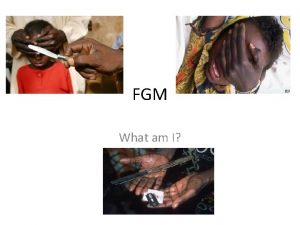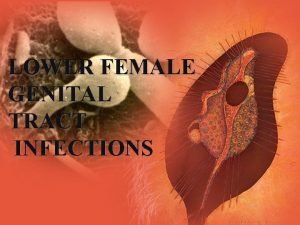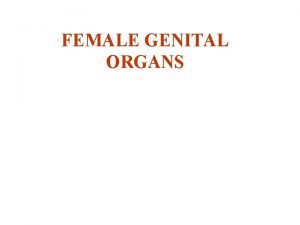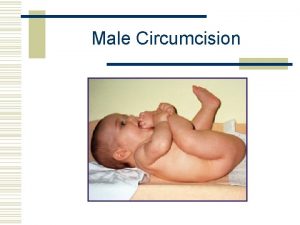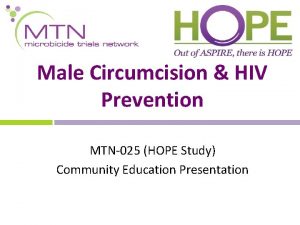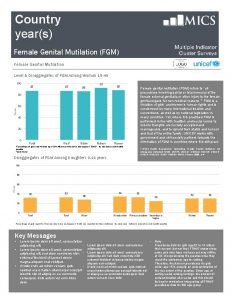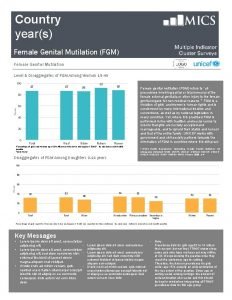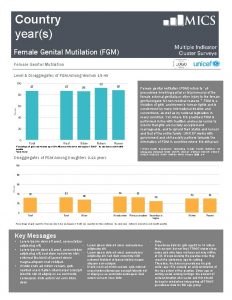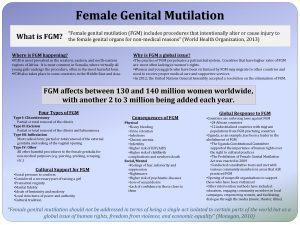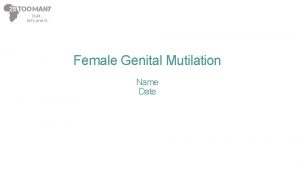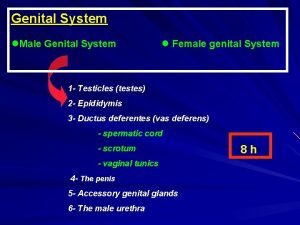Female Genital Mutilation Circumcision Naima Scego Four types












- Slides: 12

Female Genital Mutilation. Circumcision Naima Scego

Four types Type I: Clitoradectomy What is FGMC? Type II: Excision Type III: Infibulation Type IV: addresses any harmful procedures done to female genitalia that are for non-medical purposes (WHO, 2012, p. 1).

Procedure Performed by traditional female excisers A variety of tools are used to perform FGM, including razor blades and knives Use of anesthetic and sterilization are uncommon ‘Medicalization’: An Estimated 18% of all FGM is done by health-care providers, who use surgical scissors and anaesthetic

Prevalence 100– 140 million girls and women worldwide are living with the consequences of FGM/C Approximately 3. 3 million girls in Africa alone are at risk of FGM each year FGM is practiced on females most often from birth to the age of 15 however it has been known to occur with adult women before marriage FGM/C is most prevalent in 29 countries in Africa and The Middle East and Asia (Kaplan, Hechavarria, Martin & Bonhoure, 2011, p. 1)

Health Consequences Short Term Severe pain Shock Haemorrhage (i. e. excessive bleeding) Difficulty in passing urine (Kaplan et al. , 2011, p. 3). Infections Unintended labia fusion Death

Health Consequences Long Term Keloids (i. e. excessive scar tissue) Need for surgery/deinfibulation Higher rates of caesarean section, postpartum haemorrhage and prolonged maternal hospitalization Urinary and menstrual problems Painful sexual intercourse and poor quality of sexual life Infertility (Kaplan et al. , 2011, p. 3). Infections (e. g. cysts, abscesses and genital ulcers, chronic pelvic infections, UTI’s) Psychological consequences, such as fear of sexual intercourse, PTSD, anxiety, depression

Socio-cultural Factors Family Honor Marriageability The social pressure to conform with peers The assumption that FGM/C reduces women’s sexual desire, preserves virginity and prevents promiscuity The association of FGM with ideas of cleanliness (hygiene, morality) (Okeke et al. , 2012, p. 6). The belief that left uncut, the clitoris would grow excessively FGM/C is associated with cultural ideals of femininity and modesty, which include the notion that girls are “clean” and "beautiful" after removal of body parts that are considered "male" or "unclean"

Socio-cultural consequences Social Acceptance Social Mobility Bride Price Ex. In Somali culture the prospective husband's family may examine the bride to be to ensure that she is worthy of the bride price that the husband's family is paying (Althaus, 1997, p. 131).

Religious Factors FGM/C Pre-dates Religion FGM/C is practiced among some adherents of the Muslim, Christian, and Jewish faiths No religious scripts prescribe the practice but practitioners often believe the practice has religious support.

FGM/C: A Human Rights Issue FGM violates the fundamental human rights of girls and women: International Treaties: rights to health The Convention on the Elimination to be free from violence of All Forms of Discrimination to life and physical integrity against Women to non-discrimination The Convention on the Rights of the to be free from cruel and degrading treatment Child


References Althaus, F. A. (1997). Female Circumcision: rite of passage or violation of rights? . International Family Planning Perspectives. 23(3), 130 -133. Kaplan, A. Hechavarria, S. Martin, M & Bonhoure, I. (2011). Health consequences of female genital mutilation/cutting in the Gambia, evidence into action. Reproductive Health Journal. 8(26). 1 -6. doi: 10. 1186/1742 -4755 -8 -26 Okeke, T. , Anyaehie, U. , & Ezenyeaku, C. (2012). An Overview of Female Genital Mutilation in Nigeria. Annals of Medical and Health Sciences Research, 2(1), 70– 73. http//: doi. org/10. 4103/2141 -9248. 96942 World Health Organization (2012). Understanding and addressing violence against women: Female genital mutilation. 1 -8.
